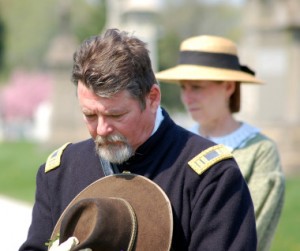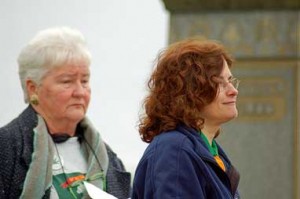
An officer of the 69th Pa. Irish volunteers bows his head in prayer. (Click photo to view slideshow.)
It happened nearly a hundred years ago.
It lasted only seven days.
The good guys lost, and their leaders were imprisoned or executed.
It was the 1916 Easter Rising, a bloody, brave but unsuccessful attempt to expel the British from Ireland and to establish a sovereign republic.
Today, more than a few Delaware Valley Irish-Americans remember, and their goals are substantially unchanged from those of the patriots of 1916.
On Sunday, several Delaware Valley Irish groups gathered once again at Holy Cross Cemetery in Yeadon to commemorate the abortive (but successful in the long run) Rising. Led by the 69th Pennsylvania Volunteers and members of the Philadelphia Emerald Society Pipe Band, the group marched to the gravesite of Joseph McGarrity, the County Tyrone-born Philadelphia businessman and a leader of Clan na Gael. They reaffirmed the Easter proclamation’s “right of the people of Ireland to the ownership of Ireland.”
McGarrity holds a special place in the republican heart. The one-time successful entrepreneur was involved in efforts to arm the forces arrayed against Great Britain. He published a fiercely pro-republican newspaper called the Irish Press. He was a friend to Irish leader Eamon de Valera (with whom he later parted company). He never gave up on the armed struggle for independence and unity.
It was a brief ceremony, but moving, as always.

